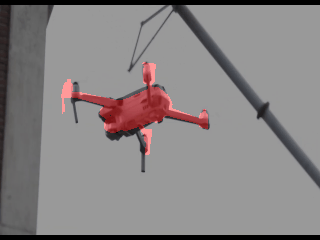DronePose: Photorealistic UAV-Assistant Dataset Synthesis for 3D Pose Estimation via a Smooth Silhouette Loss
TODO:
- Train scripts
- Evaluation scripts
- Pre-trained model
- Smooth silhoutte loss code
- Inference code
The exocentric data used to train our single shot pose estimation model, are available here and are part of a larger dataset that contains rendered color images, silhouette masks , depth , normal maps, and optical flow for each viewpoint (e.g. user and UAV). NOTE: The data should follow the same organisation structure.
The code is based on PyTorch and has been tested with Python 3.6 and CUDA 10.1.
We recommend setting up a virtual environment (follow the virtualenv documentation) for installing PyTorch and the other necessary Python packages.
You can train your models by running python train.py with the following arguments:
--root_path: Specifies the root path of the data.--trajectory_path: Specifies the trajectory path.--drone_list: The drone model from which data will be used.--view_list: The camera view (i.e. UAV or user) from which data will be loaded.--frame_list: The frames (i.e. 0 or 1) that will be loaded.--types_list: The different modalities (e.g. colour,depth,silhouette) that will be loaded from the dataset.--saved_models_path: Path where models are saved.
Our PyTorch pre-trained models (corresponding to those reported in the paper) are available at our releases and contain these model variants:




